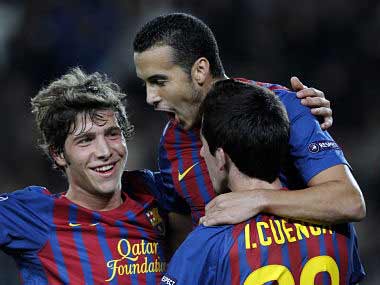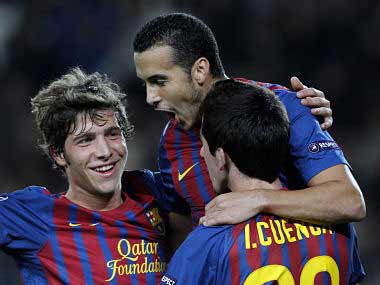Before Barcelona beat Real Madrid 3-1 at the Estadio Santiago Bernabeu in Madrid last week, they faced a Champions League dead rubber when they entertained BATE Borisov at the Nou Camp. Barcelona thrashed their opponents 4-0, but taking to the field were not the likes of Lionel Messi, Andres Iniesta and Xavi Hernandez, who had been left out the match day squad altogether by coach Pep Guardiola, who had the luxury of resting his entire regular first XI. The team that ambled past BATE, who have not quite been masters of their domain, much less anywhere else, had an average age of 21. The only noticeable name on that teamsheet was Spain international Pedro, and he was accompanied by hitherto unknown names such as Sergi Roberto, Martín Montoya, Rafinha, Thiago, Gerard Deulofeu, Isaac Cuenca and Marc Bartra. This much is certain: Barcelona currently set the benchmark in terms of blooding youth through the ranks, and no club in England will be able to match the standard of quality that these Barca youth possess. The difference being not one of training hours and schedules or international and domestic scouting networks. When clubs from England play their youth in the first team, they get a taste of competitive football. The problem is that they don’t get the taste of competitive football regularly enough. But when Barcelona do it, the system of flowing tiki-taka football that the senior players exhibit almost like a second skin is taken to with ease by the younger players. [caption id=“attachment_157992” align=“alignleft” width=“380” caption=“Football has become a global sport, and the next generation could just take it to the next level. They just need a chance. Reuters”]
 [/caption] Andre Fontas and Thiago Alcantara are on the fringes of the first team, and seem to be amalgamating with the Barca system the way a duck takes to water. The reason these players are so adept in adapting to the Club’s style of play is because of the B system prevalent in Spain, France and Germany. Nineteen-year-old midfielder Sergi Roberto has played more than 50 matches in the Spanish second tier for Barcelona B. Bartra has crossed the 70 match mark and Deulofeu, only 17, has been a regular this season. For English youngsters who find themselves in that awkward position between the youth team and the first team, the best they can aspire for before nailing down a berth in the starting eleven is reserve team football, a loan system, or for the lucky few, a few Carling and FA Cup games and a smattering of cameos off the bench in league games. Getting a loan deal is fine, but switching from the plush surroundings of London Colney or Carrington to Sheffield United’s Bramall Lane or Reading’s Madjeski Stadium can be a bit of a shocker. More often than not, trawling the news feeds on the internet leads us football fans onto a story where a loanee is given a rather ‘special’ welcome on the training ground by the team’s hardman. In other cases, the loaned players don’t clock up enough minutes on the pitch due to a large number of players from top-flight clubs being shipped to the lower divisions to gain experience. Arsenal’s Sanchez Watt, for example, who is currently on loan at Sheffield Wednesday, had to sit out a game recently because the Hillsborough club had too many other loanees on its books. What English football needs is for its clubs to play in a competitive environment. There are in England, currently two reserve leagues, the Reserve League North and the Reserve League South. If the reserve team is redeveloped, and players are playing week in, week out in front of fans — get them some 5,000 seater stadiums so they have the incentive to play better, teams could share stadia too — and make it competitive by introducing strict rules for player eligibility. It would also be a great way for some of out-of-favour players to play their way back into contention. The foundations for Reserve Team football to change are already in place. Not only are clubs building their own academies, they are also outsourcing their know how abroad, so as to maximise their crop of youth that can be reared for a future at Bayern Munich or Juventus. Chelsea recently opened their
first soccer school
in Asia — in Hong Kong — while Liverpool have one in Indonesia. Manchester United have one in China, while Arsenal have schools in Dubai, Vietnam, and most recently, Oman, which I had the opportunity of visiting recently. There have been rumours about the traditional ‘Big Four’ opening academies in India. Bayern Munich have already laid plans for the setting up of an academy in West Bengal. Think of the awareness the game could generate. Not just for the clubs, but for national teams too. With UEFA’s new Fair Play system already in place despite certain loopholes and with Michel Platini’s 6+5 rule looming on the horizon, it’s only natural that the best youngsters will end up at the biggest teams. But youth football needs to be more carefully scrutinised so as to help the development of these players. Football has become a global sport, and the next generation could just take it to the next level. They just need a chance.
[/caption] Andre Fontas and Thiago Alcantara are on the fringes of the first team, and seem to be amalgamating with the Barca system the way a duck takes to water. The reason these players are so adept in adapting to the Club’s style of play is because of the B system prevalent in Spain, France and Germany. Nineteen-year-old midfielder Sergi Roberto has played more than 50 matches in the Spanish second tier for Barcelona B. Bartra has crossed the 70 match mark and Deulofeu, only 17, has been a regular this season. For English youngsters who find themselves in that awkward position between the youth team and the first team, the best they can aspire for before nailing down a berth in the starting eleven is reserve team football, a loan system, or for the lucky few, a few Carling and FA Cup games and a smattering of cameos off the bench in league games. Getting a loan deal is fine, but switching from the plush surroundings of London Colney or Carrington to Sheffield United’s Bramall Lane or Reading’s Madjeski Stadium can be a bit of a shocker. More often than not, trawling the news feeds on the internet leads us football fans onto a story where a loanee is given a rather ‘special’ welcome on the training ground by the team’s hardman. In other cases, the loaned players don’t clock up enough minutes on the pitch due to a large number of players from top-flight clubs being shipped to the lower divisions to gain experience. Arsenal’s Sanchez Watt, for example, who is currently on loan at Sheffield Wednesday, had to sit out a game recently because the Hillsborough club had too many other loanees on its books. What English football needs is for its clubs to play in a competitive environment. There are in England, currently two reserve leagues, the Reserve League North and the Reserve League South. If the reserve team is redeveloped, and players are playing week in, week out in front of fans — get them some 5,000 seater stadiums so they have the incentive to play better, teams could share stadia too — and make it competitive by introducing strict rules for player eligibility. It would also be a great way for some of out-of-favour players to play their way back into contention. The foundations for Reserve Team football to change are already in place. Not only are clubs building their own academies, they are also outsourcing their know how abroad, so as to maximise their crop of youth that can be reared for a future at Bayern Munich or Juventus. Chelsea recently opened their
first soccer school
in Asia — in Hong Kong — while Liverpool have one in Indonesia. Manchester United have one in China, while Arsenal have schools in Dubai, Vietnam, and most recently, Oman, which I had the opportunity of visiting recently. There have been rumours about the traditional ‘Big Four’ opening academies in India. Bayern Munich have already laid plans for the setting up of an academy in West Bengal. Think of the awareness the game could generate. Not just for the clubs, but for national teams too. With UEFA’s new Fair Play system already in place despite certain loopholes and with Michel Platini’s 6+5 rule looming on the horizon, it’s only natural that the best youngsters will end up at the biggest teams. But youth football needs to be more carefully scrutinised so as to help the development of these players. Football has become a global sport, and the next generation could just take it to the next level. They just need a chance.
Gautam Viswanathan has a very simple dream: he wants to commentate at the finals of the 2022 World Cup in Qatar. A die hard football fan, Gautam's love for the game borders on the fanatical. Give him a choice between an all-expenses paid trip to Europe and Champions League final tickets and he will choose the latter without the slightest flicker of hesitation.
)